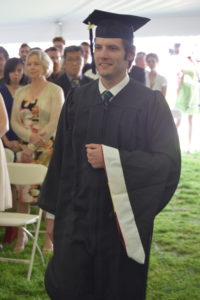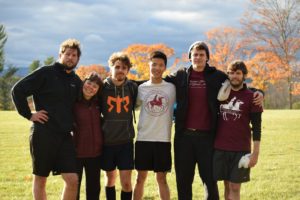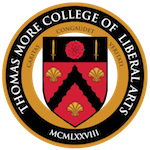 Anthony Tannus Wright, ’17, currently serves as Chief of Staff in the Department of Literacy in the Ministry of Education in Brazil. Staff writer Bridget Ruffing, ’22, recently interviewed him about his time at Thomas More College and his current educational work.
Anthony Tannus Wright, ’17, currently serves as Chief of Staff in the Department of Literacy in the Ministry of Education in Brazil. Staff writer Bridget Ruffing, ’22, recently interviewed him about his time at Thomas More College and his current educational work.
Could you tell us a bit about your life before coming to Thomas More College?
I was born and raised in São Paulo, Brazil. I went to a British school in São Paulo, when I was five years old, and at the age of twelve I went to Gordonstoun school, a boarding school in Scotland, for four years. It was primarily a Christian school for boys and girls and I really enjoyed myself there. The British and the Brazilian school systems don’t combine perfectly, so I ended up finishing high school quite early, when I was a little over sixteen years old.
I came back to Brazil, took a few years to figure out what I was going to do in life, and ended up going to law school. I graduated in 2010, and then worked in a law firm for commercial and business law. While I was working, I learned about the liberal arts and classical education, and heard about Thomas More College and through a simple Google search. So, you could say that Google had a hand in getting me into Thomas More College!
While I was working in that law firm, I was also pursuing a Master’s Degree in the Philosophy of Law at the Pontifical Catholic University of São Paulo. I was awarded a Blackstone Fellowship, a legal fellowship given to me by Alliance Defending Freedom (ADF). This enabled me to go to the United States. They then sent me to work in Rome for several weeks, in the Pontifical Council for the Family. After that they sent me back to the United States to complete the program and, after that, I decided to do some touring of the Catholic liberal arts colleges in the country.
I had an opportunity to visit Thomas More then, during the summer of 2011. There were only two students on campus at the time, but I recall meeting Paul Guenzel ’14 and Aja McCarthy ’11 (née Cowhig). I also met professors Drs. Denis and Sara Kitzinger. They gave me an explanation of how the liberal arts were taught at the College and more generally in the United States, and they gave me a good first impression of the school. I decided to apply, and was accepted into the class of 2013. I was fairly old—twenty six—when I started.
A big part of what led me to Thomas More is God’s Providence. I didn’t really have any expectations of being at Thomas More; it was kind of a Utopian plan in my life. Because of the currency exchange then, I wasn’t sure how it would work out financially. But the College had recently established the Our Lady of Guadalupe Scholarship for candidates from Mexico, South America, and Canada, and I was able to attend after being awarded this scholarship.
Are there any highlights from your years at TMC that you’d like to share?
One highlight is the sense of communitas, or community, present at the College. There are some disadvantages to a small college community, but in  general I think it’s very precious. And if someone knows how to nourish and appreciate it, it’s something that stays with you. At a large university, it may be great to meet so many people, and of course they can be much more diverse than Thomas More, where most students come from similar Catholic or Christian backgrounds. But the nice thing about Thomas More is that you get to know people very well. It might sound cliché, but the school does become a part of your family, in a sense. This is especially true because you are with the same classmates for the whole four years. In most big colleges, you end up having twenty or thirty percent of the same classmates, and not throughout the same courses.
general I think it’s very precious. And if someone knows how to nourish and appreciate it, it’s something that stays with you. At a large university, it may be great to meet so many people, and of course they can be much more diverse than Thomas More, where most students come from similar Catholic or Christian backgrounds. But the nice thing about Thomas More is that you get to know people very well. It might sound cliché, but the school does become a part of your family, in a sense. This is especially true because you are with the same classmates for the whole four years. In most big colleges, you end up having twenty or thirty percent of the same classmates, and not throughout the same courses.
There’s also a great sense of festivity at the College. Thomas More fully celebrates the liturgical calendar and highlights the English and European heritage of its patron. We celebrate the Feast of the Virgin Mary when it is the Feast of the Virgin Mary, and we celebrate other festivities, even non-Catholic ones like Burns’ Night [a Scottish tribute to the poet Robert Burns]. Those are some of the moments I really enjoyed. And the pilgrimage! Most students are able to go on the Auriesville Pilgrimage, to the Shrine of the North American Martyrs in upstate New York. All these liturgical events and celebrations—like the annual poetry contest—complement the curriculum, and balance out the academic work and studies at the College.
Another highlight is the curriculum. I think it’s a big advantage compared to other colleges. I like how Thomas More’s curriculum is organized, and how it keeps a class studying and growing together. I particularly enjoyed the Humanities sequence of courses at Thomas More College, especially studying Plato and Aristotle my first semester.
I also appreciated reading the Greek Fathers with Dr. Powers. I know the Doctor Angelicus of the Church is Thomas Aquinas, and I think Thomistic Philosophy is not as well studied as it should be, though there has been a revival in the past centuries, especially in the United States and in Europe. Nevertheless, I think the Greek Church Fathers are not appreciated as they should be, and it was so nice that I had the opportunity to do so at Thomas More.
 You’re now back in Brazil working as Chief of Staff in the Department of Literacy in the Ministry of Education. Can you tell us about your work there?
You’re now back in Brazil working as Chief of Staff in the Department of Literacy in the Ministry of Education. Can you tell us about your work there?
Well, after graduating from Thomas More in 2017, I ended up in Arizona, where I spent a year teaching at Ville de Marie Academy, a small Catholic liberal arts school. Then I left the United States and went to Israel, where I studied and worked with the Polis Institute. I was studying Greek and Hebrew, and helping with recruitment. In December of 2018, there was a presidential election in Brazil. An acquaintance of mine was offered the position of Secretary of the Literacy Department. Usually, when a government is elected, a secretary or minister has to build his team. I received a call offering me a position within the Literacy Department. I’d never really thought of working for the government, but I didn’t have much time to labor over my decision. In the end, I took the position to serve my country. It’s easy to sit around and criticize the way a country is going, especially in Brazil, but now I had the chance to work up close in the government. I thought I would be neglecting the country if I didn’t take the position, and I’ve been here since February of last year.
Is there anything in your work with the Ministry of Education that has been informed by your time and studies at Thomas More College?
It’s been very helpful to have read the classics, and to have studied how political life works. At Thomas More, you are presented with political concepts. You read Aristotle, Plato, Machiavelli and Kant, but they’re not really necessarily dealing with the nitty-gritty, day-to-day problems of how to build public policy, so there’s a difference. Nevertheless, human nature does not change and the human pursuits toward “happiness”—be they pleasure, riches, virtue, or fame—also do not change. Being in the political arena every day, meeting with senators to discuss polemical issues in Congress, and trying to persuade them that they should pass this or that bill, you discover that the old philosophers are not so old. Having studied the liberal arts at Thomas More College helps with arguing to prove that someone is wrong on a particular issue, especially when talking with members of the Parliament, who might be strongly against your views on anthropology, education, and so forth.
On the ordinary basis of what I do here—drafting laws that try to ensure students get a good education—Thomas More has also helped. It’s been helpful being able to discuss the Socratic method, and it’s something that I use all the time here. The seminar classes at Thomas More give you a chance at critical thinking, whereas in most lecture-style classes at universities, you’re not able to rationally argue against your peers.
Do you have any advice for students interested in attending TMC, specifically, international students?
First of all, pray, because it’s a big decision. Secondly, be practical and check on your finances. If you’re from Brazil or Europe, you need to figure out  how you’re going to pay and whether or not you can get a scholarship. So, pray and ponder how you’re going to finance your education—although I do think it’s worth every single cent that you’re going to spend.
how you’re going to pay and whether or not you can get a scholarship. So, pray and ponder how you’re going to finance your education—although I do think it’s worth every single cent that you’re going to spend.
Look into the curriculum. It’s important to look at what Thomas More is offering, because it’s very unique, and not many places give you the opportunity of spending four years studying the liberal arts. Being in a place like Thomas More helps you focus on what’s really necessary.
Also remember that all students at Thomas More spend a semester in Rome; one of the reasons I ended up attending the College was the opportunity to live the Roman life. I also think that all students should visit the campus; it’s hard to get to know the unique character of the place without visiting.
For those already at Thomas More, I would say that the best way to appreciate your time there is not to spend all your time there. Go into nearby Nashua for coffee or to the Nashua Garden for a sandwich; explore the White Mountains for a day. Getting off campus occasionally really makes you admire the College even more. You end up realizing how rich the culture is at Thomas More and better appreciating how great your classmates, faculty, and staff members are.
For further reading:
Alumna Works to Defend the Family: An Interview with Emily LaFata, ’18
